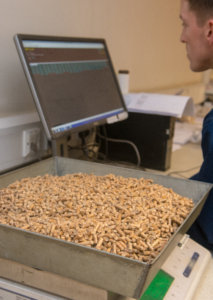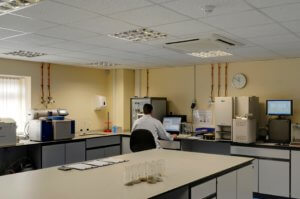WHAT IS THE DIFFERENCE BETWEEN GROSS CALORIFIC VALUE AND NET CALORIFIC VALUE?
WHAT IS CALORIFIC VALUE?
When we test Biomass, Refuse Derived Fuels (RDF), Solid Recovered Fuels (SRF), Alternative Fuels or Solid fuels, one of the key quality parameters is the Calorific Value (CV).
Calorific Value is the amount of potential energy the fuel contains which can become available, upon combustion, as heat. When assessing CV, two values are normally quoted; the Gross Calorific Value (higher) and the Net Calorific Value (lower).
HOW DO WE MEASURE CALORIFIC VALUE?

Calorific Value is measured using a calorimeter. In this process, the fuel is combusted with Oxygen, under pressure, in a sealed “bomb”. The heat of the subsequent reaction is then measured from the temperature rise of a surrounding water bath.
By calibration of the calorimeter system with, for example, thermochemical grade Benzoic Acid, the Gross CV at constant volume is determined. The analysis is obtained at constant volume as it is combusted in a fixed volume “bomb”, though it’s usual to express the result at constant pressure.
Additional analytical parameters such as the Sulphur content and the heat of formation of acids also need to be determined to compute this value accurately.
WHAT IS GROSS CALORIFIC VALUE?
Gross CV may be thought of as the maximum potential internal energy content of a fuel and can be expressed on a constant pressure or constant volume basis.
WHAT IS NET CALORIFIC VALUE?
Net Calorific Value (Net CV) is the practical amount of energy which may be realised at atmospheric (constant) pressure. This is the most practically meaningful value that is expressed on an ‘as received basis’ (i.e. including the moisture content), since that is typically how the fuel will be burned.
WHAT IS THE DIFFERENCE BETWEEN GROSS CV AND NET CV?
 The main difference between Gross Calorific Value & Net Calorific Value is related to the physical state of water after the combustion reaction.
The main difference between Gross Calorific Value & Net Calorific Value is related to the physical state of water after the combustion reaction.
A fuel may have a water or moisture content, but it also, inevitably, will inherently form water on combustion, due to its hydrogen content. These two factors effectively reduce the potential maximum energy available by removing energy (heat) from the system through;
- Utilisation of energy from the fuel combustion which is used to vaporise any free water contained in the fuel.
- Energy lost from the system as steam, from the formation of water during combustion, at constant pressure i.e. atmospheric pressure, which can be seen escaping as steam from the cooling towers of power stations.
Other parameters such as the Nitrogen, Oxygen and Halogen content also have an impact on calorific value, however the contributions from moisture and the formation of, and state of, water after combustion are the most significant, assuming of course the fuel is also low in ash-forming materials.
HOW CAN AHK HELP?
Alfred H Knight is experienced and equipped to perform CV testing on all types of biomass, solid fuels and waste and alternative fuels.
We are UKAS accredited to ISO17025 for several calorimetric standards, including BS ISO 1928, BS EN ISO 18125, BS EN 15400 and ASTM D5865. Our accreditation’s can be found here.
For further information, or if you wish to discuss your testing requirements, get in touch with an expert here.